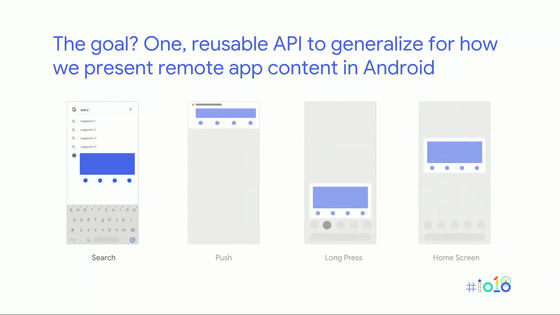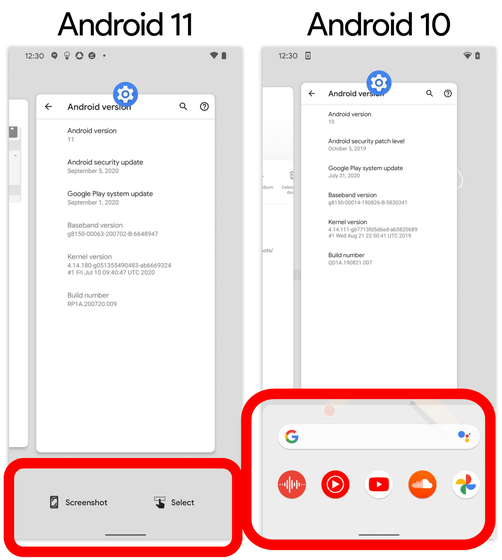Google's Android executive talks about 'Android 11'

by
Due to the impact of the new coronavirus infection (COVID-19), the 2020 annual developer conference ' Google I / O ' has been cancelled . Regarding 'Android 11', which was expected to be revealed in 'Google I / O', IT news site Ars Technica is vice president of Google's Android division Dave Burke and chief engineer Iliyan We interviewed Malchev on September 8, 2020, just before the release of Android 11.
The Android 11 interview: Googlers answer our burning questions | Ars Technica
https://arstechnica.com/gadgets/2020/09/the-android-11-interview-googlers-answer-our-burning-questions/
◆ About the impact of COVID-19 on Android development
According to Burke, COVID-19 caused 'a little confusion' at the development site. Before the COVID-19 pandemic, many engineers worked on workstations connected by USB tethering on smartphones, but by working from home, they said, 'I want to use the smartphone used for USB tethering while working on the workstation.' There was also demand. Mr. Burke built a new environment using Google Meet etc., but at first it seems that productivity dropped by 7% to 11%. However, Burke said the reduced productivity has since recovered.
Also, regarding the impact of COVID-19 on Android development, the topic of 'COVID-19 tracking API' jointly developed with Apple was raised.
Apple and Google Incorporate 'New Coronavirus Tracking System' into iOS and Android-GIGAZINE

Although some Android smartphones with unique settings that are not updated are also on sale, basically Android smartphones other than China implement the COVID-19 tracking API. 'In the United States, state governments should develop apps that use the COVID-19 tracking API, but only 6 out of 50 states have completed the app,' Burke said. To break through this situation, Google itself plans to create a COVID-19 tracking app.
◆ About 'Google Play System Update'
In Android 10 or later, a new system called 'Google Play System Update' that makes important code changes directly from Google Play is implemented, and internal components of Android 10 or later devices can be updated on the Google side. I will. This 'Google Play system updates', Google is to be appeared '12 new modules of' at the stage of the February 2020 notice had been.
Ars Technica touched on the notice and asked, 'What happened to the new module after all?' Burke replied that he added a total of 21 modules such as 'statsd' to collect telemetry statistics, Wi-Fi tethering, cell broadcasting , machine learning, SDK extension, etc. 'From the module itself The infrastructure that makes the module executable is more important. '
◆ About 'Generic Kernel Image'
Android is an OS based on the Linux kernel, but the actual Linux kernel used differs depending on the model of the Android device, resulting in fragmentation of the Linux kernel. To address this issue, a Linux kernel build called 'Generic Kernel Image (GKI)' that can be run on all Android devices is being developed.
Generic Kernel Image | Android Open Source Project
https://source.android.com/devices/architecture/kernel/generic-kernel-image

Malchev replied 'yes' to the question 'Will this GKI module also be delivered from Google Play?' All the development phases that we are currently working on are based on GKI, and we have stated that we will execute devices equipped with GKI in the future, and we will actually incorporate GKI in the smartphone 'Pixel' series developed by Google itself. And comment. Burke points out that '40% of security bugs are kernel issues,' and says that implementing GKI can significantly reduce security and device manufacturer maintenance costs.
Regarding GKI, Ars Technica asked, 'I've heard cases where an updatable kernel destroyed a device. Is there any kind of safety mechanism?' Malchev replies, 'If an update fails a boot, we have a number of failsafes that allow us to recover to the previous bootpoint of any kind of boot failure.'
Burke said, 'There are directions that have been repelled in the evolution of operating systems, such as updatable kernels, but anonymously aggregated statistics and incremental updates and rollbacks can correct this prejudice. It is possible. ' Regarding the transmission of statistics that can be turned off from 'Privacy' → 'Usage and diagnostic information' in the settings, the current situation that the majority of Android devices with 2 billion units are sending back statistics, He said the statistics collected helped improve Android, including battery life.
◆ About 'Slices'
'Slices' is a UI template like the image below that displays dynamic interactive content with the Google Search app or Google Assistant.

Ars Technica said, 'Slices seemed to have been a big hit when Android 9 was announced, but it hasn't been implemented,' and asked 'What happened to Slices?' According to Burke, Slices has already been created, but it has not been implemented because the effort on the development side and user functions are not balanced. Mr. Burke said that although the core concept is shining, information on use cases has not been collected yet, and he said that he plans to continue trial production in the future.
◆ About 'App switching screen'
In Android 11, the 'Switch apps' button screen has been revamped, and the search field and recommended apps are no longer displayed at the bottom of the screen.

Regarding this design change, Burke said, 'The idea that screenshot shooting and text / image selection functions should stand out, and the idea that it is better to put the search field and recommended apps on a part of the home screen. , We have reached this decision. ' In future updates, we will continue to improve the home launcher and the appearance of the home.
◆ About 'Dynamic System Updates'
Dynamic System Updates (DSU) is a developer feature that boots another Android as a guest OS while preserving the main Android settings.
Dynamic System Updates (DSU) | Android Developers | Android Developers
https://developer.android.com/topic/dsu?hl=ja

According to Malchev, the DSU is intended to be used to test beta builds and will be used to run Generic System Images and more without compromising factory settings. With DSU, it is expected that if a developer needs a device for development, he / she will be able to create an environment in which the system image can be executed without causing an accident such as 'destroying the system image of Samsung'.
Related Posts:







